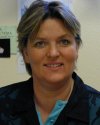 |
Lára
Stefánsdóttir, Head of the ICT department: Development courses for teachers in The Akureyri Junior College |
One of the most important factors when focusing on ICT in education is providing teachers with development courses that can support what they want to learn in order to change their working methods and teaching. Our experience is that courses that are provided within the school, either distance courses or on site, seem to have much better results than courses that teachers attend at other places. We think this is because if the course is on site it means that teachers can use their own tools and environment while studying and therefore relate what they are learning much better to their job than if they are somewhere else where the computer system, the computers and environment is totally different from what they are used to.
When the ICT development project started in the school in the autumn 1998 teachers were asked in a questionnaire what they knew and needed. Instead of asking detailed questions based on the definition of the ICT department the questionnaire asked:
Creating Web Pages:
I know what I need to know
I need to increase my knowledge. Specially in: ...
So actually the answer "I know what I need to know" could actually mean that the teacher didn't know anything but didn't think any knowledge was needed. So the development courses were totally based on what the teachers defined they needed to learn and what they wanted to learn. That relates to the basic ideology that the teacher "knows best" that he or she is an educational specialist and should be provided with services on using ICT in the teaching and learning environment. With the answers teachers gave on what they wanted to increase, their knowledge courses were provided either by the school itself, in collaboration with Fjölbrautaskólinn við Ármúla (FÁ) or teachers got the opportunity to attend courses provided by others. Through collaborating with FÁ we could teach their teachers through distance education as well as get distance education from them and therefore share the work on providing courses. Due to this we could offer courses where there were only few in our own school that needed that course since there were always some in FÁ that filled up the course and that lead to more variety in courses. The courses have both been on the tools (learning how to use certain software) as well as pedagogical courses on how ICT could be implemented in different circumstances with focus on known models or ideology, or our own ideas.
Since then the school has provided courses each school year for the 46 teachers in the school and now when the third school year is close to an end we have offered 15 different courses either ourselves or with FÁ, two times we have got teachers to teach in the school, and our teachers have attended at least 5 different courses (big and small) from other institutions. All teachers but one have at least participated in one of the courses and many have been very active participating. We don't pressure tthose who do not participate, we leave this up to the teachers themselves and the activity on ICT in the subjects is increasing so fast that we have our hands full as it is.
The cost of development courses on ICT is of course a big factor but The Ministry of Education, Culture and Research funded courses for teachers on ICT from The Institute of Continuing Education at The University of Iceland and that institution accepted the teachers both in our school as well as FÁ as teachers on development courses within the ICT field. This has been vital for our development and a great support to our work.
Examples of courses:
- How to create web pages
- How to plan activities where students deliver their tasks on the web
- WebQuests™
- Lectures with PowerPoint™ slides
- Math and Excel™
Our problem has been that the ICT activity has increased so rapidly and the workload of the ICT department as well, that we haven't had time to offer all the courses we want and the teachers are requesting. Still courses are provided and we try to keep on providing development courses to teachers in our school or find others to do it but then in such a way that teachers can attend in their own working place. The teachers can solve tasks in the courses they are attending that they can use directly in the classroom and know the tools (the software). That also increases the continuity in their work, it is easier to do the same or similar next time.
©Lára Stefánsdóttir. 2001. lara@lara.is http://www.lara.is All rights reserved
Picture:
©Sverrir Páll Erlendsson, svp@ma.is,
http://www.ma.is/kenn/svp, All rights
reserved